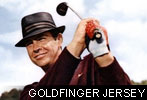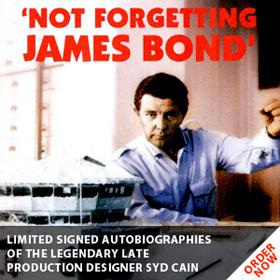Young Bond author Charlie Higson shares his approach to writing |
Young Bond - 07-09-13
Author Charlie Higson, who penned the top-selling Young Bond series of novels, has shared his strategy for writing for young readers in the Daily Mail:I came late to writing for children, when I was approached by the Ian Fleming estate to write the early adventures of James Bond, and I wasn�t sure where to start.
How sophisticated should I make the plots and language? How much historical and background information could I include without it seeming like a history lesson? What should be the balance of dialogue and description?
One thing I did know. I was going to write books in which the central character was a child, rather than a series of �children�s books�.
I felt it was very important to make the books as serious and realistic as possible.
Writing for kids is hard, and writing for boys is very hard � they have so many other things they could be doing than reading books.
We adults persevere because we have the guilty feeling that if you start a book you have to finish it.
If you don�t grab a young reader straight away, you�ve lost. And once you�ve grabbed them you have to hold them, or the minute your back�s turned they�re off playing Call Of Duty on the X-Box.
You must never talk (or write) down to kids. I wanted to get away from the Enid Blyton template, where the villains don�t do anything more threatening than speak in gruff foreign accents and occasionally tie people up.
To get round our moral guardians� squeamishness about violence there had been a tradition for kids� adventure books to be jokey and daft, but writers like Darren Shan with his Vampire�s Assistant books, Anthony Horowitz with the Alex Rider books and Robert Muchamore with Cherub (both teen spy series) had seen that there was a gap in the market for full-blooded action adventure stories for boys.
Look at the films they watch, the TV shows they enjoy, the computer games they play. If you want them to stop for a moment and read a book it�s going to have to offer them the same sort of glamour and excitement.
Of course, if you get it right, a book can go so much deeper than a film or game, and if you�re clever you can smuggle in a lot of sophisticated concepts � such as empathy, morality, philosophy, history � beneath the veneer of action and violence.
Boys like doing things. They�re interested in objects and how they work, like cars and castles and weapons and gadgets and computers. And they like their heroes to be doing things.
They want action and movement, not too much introspection and emphasis on the emotional side. Bond has a stiff upper lip and don�t forget it.
To be absolutely sure my books would work I used my own boys as guinea pigs.
As I wrote each chapter I read it to them as a bedtime story to see what they liked and disliked. I�d introduce a character and they�d say, �I don�t like him, kill him.�
I tried to explain that you couldn�t just have a character pop up and be instantly mown down, and they�d say, �Why not?� I was the writer, I could do what I wanted.
�Throw him off a cliff and make sure he hits every rock on the way down!� If my boys had had their way the books would have been just one killing after another, each one more gruesome than the last.
I had to use my youngest boy as a guinea pig again when I came to write my current series of books.
My The Enemy novels are horror, set in a world where a disease has turned all the adults into zombies who roam the streets preying on children. I wanted them to be genuinely terrifying, but how far could I go? So it was back to the old bedtime story routine again.
However, when I read my son the first really scary part he wasn�t in the least bit perturbed. I realised that modern kids have been exposed to so much more than I ever was at that age � in a long lost innocent time before DVDs, the internet and computer games � and they�re much harder to scare. He was refusing to get scared, and the challenge was on.
As the book went on it became more and more violent and gory and distressing until we were about halfway into it and I�d finished reading to him one night and gone to bed, only to be woken at four in the morning by a terrified, tear-drenched child who�d had an awful nightmare based on the book.
And I leapt out of bed, my heart pounding� and punched the air. Yes! I�d finally got him!
Consequently my Enemy books have as much suspense, terror and gore as you will find in any adult horror novels, which is why kids reading them feel very grown-up and why grown-ups seem to enjoy them just as much as their children.
 Discuss this news here...
Discuss this news here...



